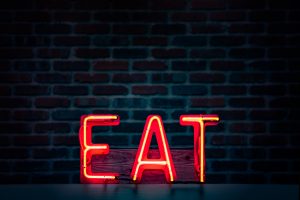 If you’ve heard eating late at night will make you fat and believe it occurs because of the time of day, you’d be wrong. A calorie is a calorie, no matter when you eat it. No matter what time of day you eat, it takes 3500 calories to add a pound, so if there’s more to it than just when you eat. It’s all about what you eat and how much. One study following 1600 children showed there was no link between excess weight and eating the last meal of the day after 8 PM. Other studies on adults showed that of the smaller sampling of 52 adults, those that ate later often ate more calories than those who quit eating earlier.
If you’ve heard eating late at night will make you fat and believe it occurs because of the time of day, you’d be wrong. A calorie is a calorie, no matter when you eat it. No matter what time of day you eat, it takes 3500 calories to add a pound, so if there’s more to it than just when you eat. It’s all about what you eat and how much. One study following 1600 children showed there was no link between excess weight and eating the last meal of the day after 8 PM. Other studies on adults showed that of the smaller sampling of 52 adults, those that ate later often ate more calories than those who quit eating earlier.
People who eat late at night may already have consumed three meals and snacks during the day.
If you’ve eaten your normal calorie allotment throughout the day and then add a late night snack, it only makes sense that you’ll gain weight. You’re eating more calories. However, people who work a second shift or those with long hours don’t have to worry about packing on the pounds if they’re eating normal healthy meals when they finally get a chance to eat.
It’s what you eat and the calories, not when you eat.
Unfortunately, many people who eat late at night are either snacking or too tired to prepare a healthy meal. They often opt for fast food or that pint of Ben and Jerry’s in the freezer. It’s about what you eat and having healthier food accessible and easy to grab. Prepare ahead of time if you get the nighttime munchies. Have fresh fruit and vegetables ready to eat. Freeze some grapes for a quick summer treat or freeze banana pieces to make an ice cream like concoction that only requires the frozen banana pieces and a blender.
When you eat later at night, you tend to eat more.
Studies show that late night eaters tended to consume more food. That could explain the connection to eating later and gaining weight. It is, after all, about calorie intake. Meal timing studies have shown that people who ate closer to bedtime tended to eat more calories than those who ate earlier. In fact, one study showed that those who consumed food between eleven at night and five in the morning at about 500 calories more than those who ate only during daytime hours. That put on an average of then pounds more for those who ate at night.
- People who eat at night may be emotional eaters, who eat not to fill the hunger void, but to fill other voids in their life and use food to combat stress, boredom, sadness or anxiety. Emotional eating leads to poor food choices.
- When you’re tired, you tend to make bad decisions when it comes to food and crave higher calorie foods. Lack of sleep can cause this.
- Not only does what you eat make a difference, so does what you drink. Sugary drinks, even fruit juices, can pack on the pounds without you realizing it.
- If you’re a late night eater, you may not need to eat breakfast. You can eat a later breakfast or skip it entirely if you’re full. There’s no fast and hard rule about when people should eat to lose weight. It’s all about the calorie count.
For more information, contact us today at LIV Fitness
